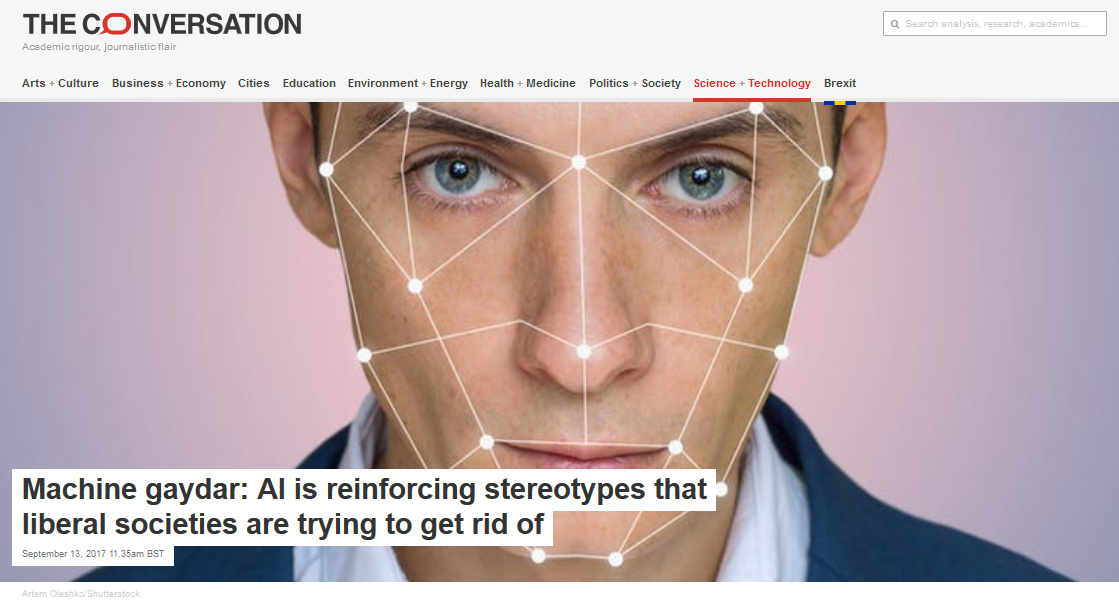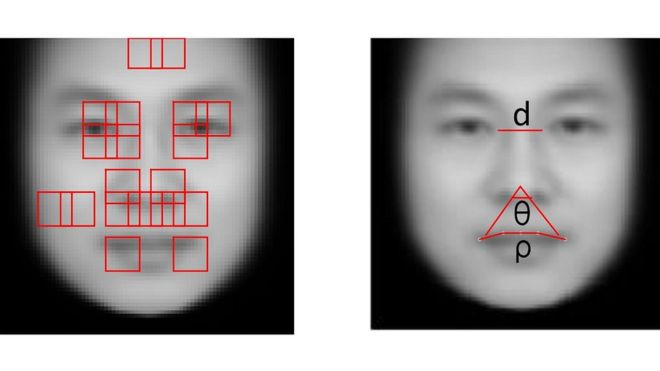
On September 7th the Guardian published an article drawing attention to a study from Stanford University which had applied Deep Neural Networks (a form of machine learning AI) to test if they could distinguish peoples’ sexual orientation from facial images. After reading both the original study and the Guardian’s report about it, there were so many problematic aspects about the study that I immediately had to write a response, which was published in the Conversation on September 13th under the title “Machine gaydar: AI is reinforcing stereotypes that liberal societies are trying to get rid of“.
Continue reading In the Conversation: “Machine gaydar: AI is reinforcing stereotypes that liberal societies are trying to get rid of” →
The 4th Winchester Conference on Trust, Risk, Information and the Law took place at the University of Winchester on Wednesday 3rd May 2017. The overarching theme of the day was “Artificial and De-Personalised Decision-Making: Machine-Learning, A.I. and Drones”: offering a chance for multi-stakeholder and interdisciplinary discussion on the risks and opportunities presented by algorithms, machine learning and artificial intelligence.
Continue reading UnBias project contribution to the 4th Winchester Conference on Trust, Risk, Information and the Law →
 A recent report from the BBC covers one instance of the ever-growing use of algorithms for social purposes and helps us to illustrate some key ethical concerns underpinning the UnBias project.
A recent report from the BBC covers one instance of the ever-growing use of algorithms for social purposes and helps us to illustrate some key ethical concerns underpinning the UnBias project.
Continue reading The need for a responsible approach to the development of algorithms →
 A lot has been said about algorithms working as gatekeepers and making decisions on our behalf, often without us noticing it. I can surely find an example in my daily life where I do notice it and benefit from it. This happens when I use the “Discover Weekly” Spotify play-list. By comparing my listening habits to that of other users with similar but not identical choices, Spotify allows information on the fringes to be shared. It is thus “tailored” to my music taste, and it is incredibly accurate in predicting things I would like. Besides, it lets me discover new music and bands and in many occasions can also take me back in time with some tunes I have probably not listened to for a long time.
A lot has been said about algorithms working as gatekeepers and making decisions on our behalf, often without us noticing it. I can surely find an example in my daily life where I do notice it and benefit from it. This happens when I use the “Discover Weekly” Spotify play-list. By comparing my listening habits to that of other users with similar but not identical choices, Spotify allows information on the fringes to be shared. It is thus “tailored” to my music taste, and it is incredibly accurate in predicting things I would like. Besides, it lets me discover new music and bands and in many occasions can also take me back in time with some tunes I have probably not listened to for a long time.
Continue reading Algorithmic discrimination: are you IN or OUT? →
Emancipating Users Against Algorithmic Biases for a Trusted Digital Economy


 A recent report from the BBC covers one instance of the ever-growing use of algorithms for social purposes and helps us to illustrate some key ethical concerns underpinning the UnBias project.
A recent report from the BBC covers one instance of the ever-growing use of algorithms for social purposes and helps us to illustrate some key ethical concerns underpinning the UnBias project. A lot has been said about algorithms working as gatekeepers and making decisions on our behalf, often without us noticing it. I can surely find an example in my daily life where I do notice it and benefit from it. This happens when I use the “Discover Weekly” Spotify play-list. By comparing my listening habits to that of other users with similar but not identical choices, Spotify allows information on the fringes to be shared. It is thus “tailored” to my music taste, and it is incredibly accurate in predicting things I would like. Besides, it lets me discover new music and bands and in many occasions can also take me back in time with some tunes I have probably not listened to for a long time.
A lot has been said about algorithms working as gatekeepers and making decisions on our behalf, often without us noticing it. I can surely find an example in my daily life where I do notice it and benefit from it. This happens when I use the “Discover Weekly” Spotify play-list. By comparing my listening habits to that of other users with similar but not identical choices, Spotify allows information on the fringes to be shared. It is thus “tailored” to my music taste, and it is incredibly accurate in predicting things I would like. Besides, it lets me discover new music and bands and in many occasions can also take me back in time with some tunes I have probably not listened to for a long time.